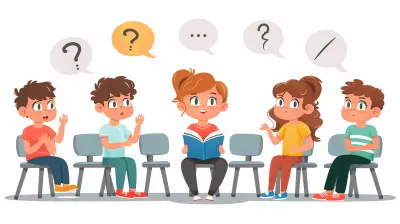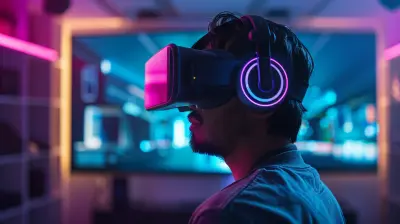Leadership in Education: Navigating the Challenges of Remote Learning
18 July 2025
Education, a beacon of enlightenment, once flourished within the walls of a classroom. Teachers stood before students, their words echoing through halls lined with books. But then, the world shifted. The blackboards turned into screens, and classrooms dissolved into pixels. Leadership in education took on an entirely new meaning—one that demanded resilience, adaptability, and innovation.

The Digital Age of Learning: A New Frontier
The transition from traditional classrooms to online learning wasn't just a switch—it was a seismic shift. Schools had to pivot overnight, teachers became tech wizards, and students grappled with distractions at home. Suddenly, leadership wasn’t just about guiding a school; it became about navigating uncharted waters.Great educational leaders don't just manage change—they embrace it. In this digital age, successful leadership is no longer about control but about connection, no longer about authority but about accessibility.

The Challenges of Remote Learning
1. The Digital Divide: Bridging the Gap
Not all students had the luxury of a stable internet connection or a quiet place to study. Some struggled with shared devices, while others had to balance school with home responsibilities. The digital divide widened, and leaders had to step in—not just with empathy, but with action.- Schools began distributing laptops and tablets.
- Internet access programs became a priority.
- Educators got creative with offline materials.
A great leader doesn't just acknowledge the problem; they find solutions that create real impact.
2. Keeping Students Engaged: Beyond the Screen
A classroom is more than desks and chairs—it's an experience. The laughter, the debates, the casual interactions in the hallways—all disappeared when learning went remote. Teachers now faced the herculean task of keeping students engaged through a screen.How do you make a virtual classroom feel alive?
- Interactive lessons replaced monotonous lectures.
- Breakout rooms encouraged collaboration.
- Gamification turned learning into a challenge rather than a chore.
Leading through this challenge meant acknowledging that engagement wasn’t just about participation—it was about inspiration.
3. Teacher Burnout: The Unseen Battle
Educators became overnight tech experts, juggling lesson plans, troubleshooting Zoom, and managing their own families—all at once. The weight of remote learning pressed heavily on them, and burnout became a silent epidemic.True leadership meant not only supporting students but also empowering teachers. That meant:
- Encouraging professional development in digital tools.
- Implementing mental health initiatives.
- Fostering a culture of appreciation and flexibility.
Because a burnt-out teacher cannot light the way for students.
4. Parental Involvement: A Double-Edged Sword
In remote learning, parents unintentionally became co-teachers. Some excelled, while others struggled. Not every household was equipped for this new dynamic, and tensions rose.Educational leaders had to redefine communication, offering:
- Workshops for parents on digital tools.
- Flexible schedules for students with working guardians.
- Consistent check-ins to offer guidance.
Collaboration became the new cornerstone of education.

Effective Leadership Strategies in Remote Learning
1. Adaptability: The Lifeline of Leadership
Rigid leadership crumbles under pressure. Those who embraced change thrived. From altering lesson plans to redefining success metrics, adaptability became the secret weapon of visionary leaders.2. Communication: Clarity in Chaos
In a remote world, miscommunication was the enemy. Leaders had to step up their game:- Clear guidelines.
- Regular check-ins.
- Open channels for feedback.
A great leader doesn’t just speak; they listen.
3. Emotional Intelligence: Leading with Empathy
More than ever, education required empathy. Understanding the emotional toll of remote learning on students, teachers, and parents was crucial.- Encouraging mental health days.
- Creating peer support groups.
- Showing vulnerability as leaders.
Because leadership isn’t about having all the answers—it’s about making people feel seen and heard.
4. Investing in Professional Development
Remote learning had a steep learning curve. The best leaders ensured their educators were equipped with the right skills, offering:- Training in digital teaching tools.
- Webinars on student engagement strategies.
- A culture of continuous learning.
A well-trained teacher becomes the torchbearer of effective remote education.

The Future of Education Leadership
Remote learning isn't just a pandemic-era experiment; it's a glimpse into the future. Hybrid models, blended learning, and ed-tech innovations are here to stay. Leaders in education must continue evolving, embracing emerging technologies while never losing sight of the human connection that makes learning meaningful.The best leaders in education are not those who resist change, but those who wield it like a compass—guiding students and teachers toward a brighter future, no matter the challenges that lie ahead.
Final Thoughts
Leadership in education is no longer just about policies and protocols; it's about people. It’s about standing firm while the world shifts, about leading with heart when screens replace classrooms, and about inspiring others to rise despite the odds.Because true leadership isn’t measured by titles or authority—it’s measured by the lives it transforms.
all images in this post were generated using AI tools
Category:
Leadership SkillsAuthor:

Anita Harmon
Discussion
rate this article
1 comments
Tamara McGhee
This article effectively highlights the essential leadership strategies necessary for overcoming remote learning challenges and fostering an engaging educational environment.
August 15, 2025 at 10:43 AM

Anita Harmon
Thank you for your insightful comment! I'm glad to hear you found the leadership strategies effective in addressing remote learning challenges.


